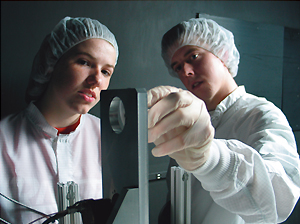GRADUATE STUDIES
SPACE SCIENCE
The Institute offers exceptional graduate study in space science. Rare among academic programs in space science, graduate students are able to design and build experiments, fly payload, and analyze the data from the Institute's active program of developing payloads for sounding rocket investigations. EOS is among the top-ranked U.S. universities in NASA funding and has been designated a NASA "Center of Excellence" in solar-terrestrial theory. Among the Institute's achievements in space science was the development of the Compton Telescope (COMPTEL) on the Compton Gamma Ray Observatory, one of NASA's "Great Observatories."
Students in space science at EOS earn a Ph.D. in Physics through the University of New Hampshire. Currently there are 21 EOS faculty in Space Science with areas of research that include: magnetospheric and ionospheric physics, astrophysics, gamma ray astronomy, solar-terrestrial physics, atmospheric sciences, space plasma physics, cosmic ray physics, and computer engineering.
Ph.D. students are enrolled in the Physics Department and tailor their academic path with guidance from their advisory committee. EOS course offerings (links to table) are often a central part of their academic program. A thesis committee of at least five members advises the Ph.D. student and conducts required examinations. Students are encouraged to include one committee member from outside the Physics Department.
At the master's level, students are also matriculated in the Physics Department. The Department of Physics offers M.S. options in Space Physics and Astrophysics, Nuclear and Neutron Physics, Condensed Matter Physics, Physics Education Research, and Complexity Measure.
Astrophysics Research Focus . . .
Space Plasma Physics Research Focus . . .
EOS Course Offerings . . .
